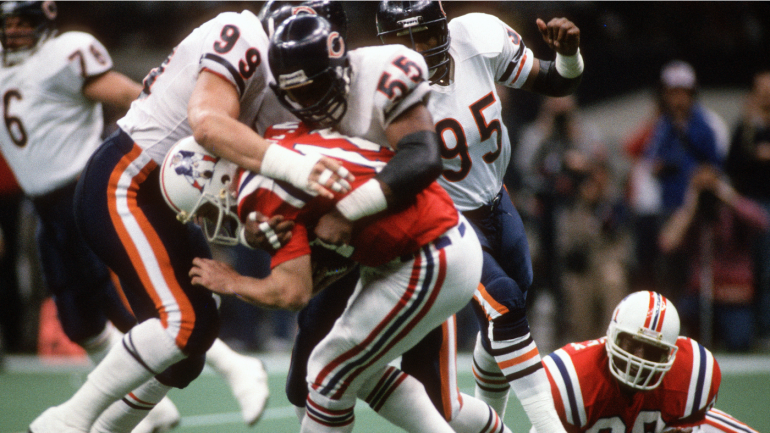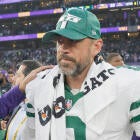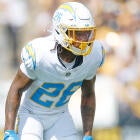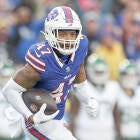
Records are made to be broken. But that doesn't mean that they will be broken anytime soon.
Super Bowl records have been set and reset dozens of times over the past 55 years, but some records continue to stand the test of time. And while no record is completely untouchable, there are a few Super Bowl records that may never be broken.
With Super Bowl LVI upon us, we decided to take a look at the top-five Super Bowl single-game records that may never be broken.
5. Bears allow just seven yards rushing
No, that's not a misprint. In Super Bowl XX, the Bears' dominant defense, led by game MVP Richard Dent, held the Patriots to a mere seven rushing yards on 11 attempts in Chicago's 46-10 victory over New England.
The Patriots, led by running back Craig James, finished sixth in the NFL in rushing during the 1985 regular season. But after falling behind by 17 points midway through the second quarter of Super Bowl XX, New England gave up on its running game. That decision, simply put, did not pay off, as Patriots quarterbacks Steve Grogan and Tony Eason combined to complete 50% of their pass attempts while throwing two interceptions and getting sacked seven times.
The previous record for fewest rushing yards allowed by a team in a Super Bowl was 17 in Super Bowl IX, as the Steelers' defense held the Vikings to .81 yards per carry while keeping Minnesota's offense out of the end zone.
4. Rod Martin's three interceptions
Only a handful of players have recorded at least two interceptions in a Super Bowl. That group includes former Cowboys linebacker Chuck Howley, Dolphins safety Jake Scott, Washington defensive back Barry Wilburn, Cowboys cornerback Larry Brown and Buccaneers defensive backs Dwight Smith and Dexter Jackson. Howley, the first player to record multiple picks in a Super Bowl, is still the only player from a losing Super Bowl team to be named the game's MVP. Scott took home MVP honors following his performance two years later, as the Dolphins capped off a perfect 17-0 season with a 14-7 win over Washington. Brown and Jackson also took home MVP hardware after helping lead their respective teams to victory on pro football's biggest stage.
But only one player, Raiders linebacker Rod Martin, has recorded three interceptions in one Super Bowl. Martin pulled off that feat in Super Bowl XV, as his three interceptions off of Eagles quarterback Ron Jaworski helped Oakland pull off a 27-10 upset victory.
“I got another one in me.”
— Las Vegas Raiders (@Raiders) October 23, 2021
Raiders legend Rod Martin recaps his record-breaking three-interception day during Super Bowl XV against the Eagles. pic.twitter.com/5W4E9S0BHr
Despite his heroics, Martin was not named MVP of Super Bowl XV. The award instead went to quarterback Jim Plunkett, who came off the bench during the 1980 season to help lead the Raiders to their second Super Bowl victory in five years. Against the Eagles, Plunkett went 13-of-21 for 261 yards and three touchdowns that included an 80-yard touchdown pass to Kenny King, which was at the time the longest play from scrimmage in Super Bowl history.
3. John Riggins' 38 carries
No running back has come close to matching Riggins' usage total in the years following his epic performance in Super Bowl XVII. Riggins, who rushed for an NFL-record 610 yards during Washington's run through the 1982 postseason, gained 166 of those yards during Washington's 27-17 win over the Dolphins in Super Bowl XVII.
Riggins, who took home the game's MVP trophy, also recorded the game's biggest play. Trailing by four points late in the second half and facing a fourth-and-1 on the Dolphins' 42-yard-line, Riggins broke Miami cornerback Don McNeal's tackle and raced down the far sideline for the game-winning score.
🎥 January 30, 1983: 37 years ago today
— The Action Network (@ActionNetworkHQ) January 30, 2020
Super Bowl XVII: Redskins (+3 | O/U 36.5) vs Dolphins
🗣 “He’s going to go all the way!”
John Riggins scores a 43-yard TD on a crucial 4th & 1 to give Washington the 4th quarter lead and the eventual 27-17 win.pic.twitter.com/Up1NGgJW5K
Riggins' 38-carry record broke the mark formerly held by Steelers running back Franco Harris, who rushed for 158 yards on 34 carries in Pittsburgh's win over Minnesota in Super Bowl IX. Harris, who also held the record for most rushing yards in a Super Bowl prior to Riggins' performance, broke both of Larry Csonka's Super Bowl rushing records that were established a year earlier in Super Bowl VIII, when Csonka rushed for 145 yards and two scores on 33 carries in Miami's 23-7 win over the Vikings.
While his record for most single game Super Bowl attempts still stands, Riggins' single-game record for rushing yards was broken one year later by Marcus Allen, whose 191 rushing yards helped the Raiders upset Riggins and Washington 38-9. Four years later, Allen's record would be topped by Washington running back Timmy Smith, whose 204 rushing yards in Washington's 42-10 win over the Broncos is still the Super Bowl single game rushing record.
2. Bob Griese's seven pass attempts
In Super Bowl VI, Griese threw 23 passes in Miami's 24-3 loss to Dallas. He threw a combined 18 passes in the next two Super Bowls that included seven pass attempts in the Dolphins' 24-7 win over the Vikings in Super Bowl VIII. Griese spent most of his afternoon handing the ball to game MVP Larry Csonka, who rumbled for 145 yards and two touchdowns on 33 carries.
When he did drop back to pass, Griese, who completed six of his seven attempts, mostly had success. On the game's first third down, Griese's 13-yard completion to Jim Mandich set up Csonka's first touchdown. On Miami's next possession, another 13-yard completion, this one to Marlin Briscoe, set up Jim Kiick's short touchdown run. With a 17-0 lead at the start of the second half, Griese's 27-yard completion to Paul Warfield set up Csonka's game-clinching touchdown.
1. Washington's 35 points in one quarter
No one saw Washington's second-quarter onslaught coming. After allowing a 56-yard touchdown pass less than two minutes into the game, Washington's deficit increased to 10 points as the first quarter came to a close. Making matters worse was the apparent injury to quarterback Doug Williams, who temporarily had to leave the game.
But when the second quarter began, Williams returned to the field before leading the most improbable scoring spree in Super Bowl history. The scoring started on Williams' 80-yard touchdown pass to Ricky Sanders' on Washington's first offensive play of the quarter. Following a Broncos punt, a 27-yard touchdown pass from Williams to Gary Clark gave Washington the lead with 10:51 left until halftime.
After a missed field goal by Denver's offense, a 58-yard touchdown run by Timmy Smith extended Washington's lead to 21-10 with 6:53 remaining in the quarter. After another Broncos three and out, Williams found Sanders open for a 50-yard touchdown, as Washington took an insurmountable 28-10 lead with four minutes to play until halftime.
Washington was not done scoring. Barry Wilburn's interception of Broncos quarterback John Elway led to Williams' eight-yard touchdown pass to tight end Clint Didier. The historic quarter gave Washington a 35-10 halftime lead en route to a 42-10 victory.
#WashingtonFootball lights up Super Bowl XXII with a magical, NFL postseason record 35-point second quarter explosion.
— Kevin Gallagher (@KevG163) January 31, 2022
Today in 1988 pic.twitter.com/jE5qCsZflM
During the record-setting quarter, Washington scored a record 35 points while racking up 356 yards of offense. Amazingly, Washington was able to do this despite having the ball for just 19 plays while possessing the ball for just 5 minutes and 54 seconds. Clark finished the game with a then Super Bowl record 193 receiving yards, while Smith's 204 rushing yards remains a Super Bowl record. Williams, who finished the game with 340 yards and four touchdown passes to earn the game's MVP award, became the first African American starting quarterback to win the Super Bowl.
![[object Object] Logo](https://sportshub.cbsistatic.com/i/2020/04/22/e9ceb731-8b3f-4c60-98fe-090ab66a2997/screen-shot-2020-04-22-at-11-04-56-am.png)


















